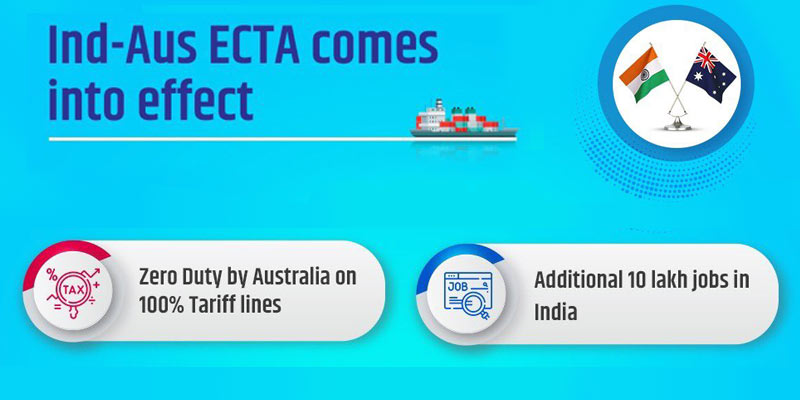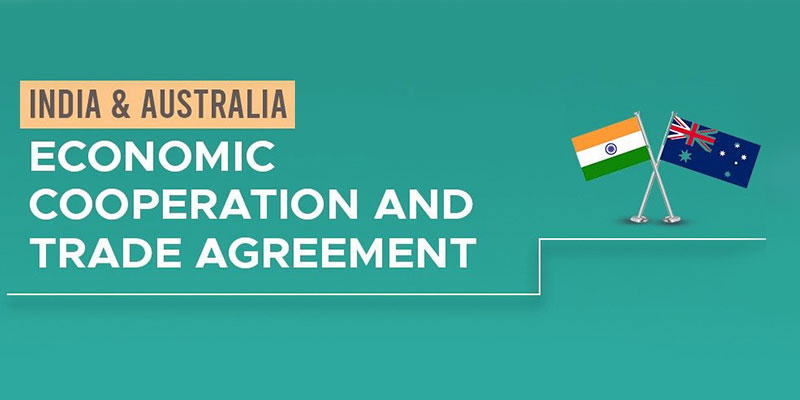- India
- Dec 29
India-Australia ECTA comes into force
The India-Australia Economic Cooperation and Trade Agreement (ECTA) has come into force from December 29.
The agreement was signed on April 2, 2022.
It will help in almost doubling the bilateral commerce to $45-50 billion in around five years.
India-Australia trade relations
• India and Australia established diplomatic relations in the pre-Independence period, with the establishment of India Trade Office in Sydney in 1941. The end of the Cold War and simultaneously India’s decision to launch major economic reforms in 1991 provided the first positive move towards development of closer ties between the two nations.
• The bilateral relationship has undergone evolution in recent years, developing along a positive track, into a strategic partnership.
• Building on the elevation of relations with Australia from a Strategic Partnership to a Comprehensive Strategic Partnership (CSP) in June 2020, the year 2021-22 saw increasing depth and breadth of engagements in the bilateral, trilateral and plurilateral formats, with progress made on various initiatives agreed under the CSP, including establishment of new mechanisms for cooperation.
• Australia is the 17th largest trading partner of India, while New Delhi is Canberra’s 9th largest partner. India’s goods exports were worth $6.9 billion and imports aggregated to $15.1 billion in 2021.
• India and Australia are partners in the trilateral Supply Chain Resilience Initiative (SCRI) arrangement along with Japan which seeks to enhance the resilience of supply chains in the Indo-Pacific Region.
• Further, India and Australia are also members of the Quad, also comprising the US, and Japan, to further enhance cooperation and develop partnership across several issues of common concern.
• The India-Australia ECTA will further cement the already deep, close and strategic relations between the two countries and will significantly enhance bilateral trade in goods and services, create new employment opportunities, raise living standards, and improve the general welfare of the peoples of the two countries.
• Australia has traditionally been a major trading partner for the Indian garment industry with exports occupying a share of about 4 per cent of total Australian garment imports.
• India’s goods exports to Australia stood at $8.3 billion and imports from the country aggregated to $16.75 billion in 2021-22.
Highlights of the agreement
• The India-Australia ECTA provides an institutional mechanism to encourage and improve trade between the two countries.
• India will benefit from preferential market access provided by Australia on 100 per cent of its tariff lines, including all the labour-intensive sectors of export interest to India, such as gems and jewellery, textiles, leather, footwear, furniture, food, and agricultural products, engineering products, medical devices and automobiles.
• On the other hand, India will be offering preferential access to Australia on over 70 per cent of its tariff lines, including lines of export interest to Australia, which are primarily raw materials and intermediaries such as coal, mineral ores and wines.
• For trade in services, Australia has offered wide-ranging commitments in around 135 sub-sectors and Most Favoured Nation (MFN) status in 120 sub-sectors covering key areas of interest to India.
• On the other hand, India has offered market access to Australia in around 103 sub-sectors and Most Favoured Nation status in 31 sub-sectors from the 11 broad service sectors such as ‘business services’, ‘communication services’, ‘construction and related engineering services’, and so on.
• Australian wine will gain from reduced-duty access to the Indian market. India charges 150 per cent duty on wines, the highest on any product in India. Under ECTA, Australian wines priced above $5 for a 750ml bottle can enter India at reduced duties.
• For the pharma segment, the pact would provide fast-track approvals and fast-track quality assessment/inspections of manufacturing facilities.
• In the services sector, benefits for India include post study work visa of 2-4 years for Indian students on reciprocal basis, and work and holiday visa arrangement for young professionals.
• The pact will create new opportunities for jobs and businesses in both countries, while laying the foundations for a full free trade agreement.
• It is estimated that an additional 10 lakh jobs would be created in India under ECTA.
• Indian yoga teachers and chefs are set to gain with the annual visa quota. Over 1 lakh Indian students would benefit from post-study work visa (1.5-4 years) under the ECTA. The agreement is also likely to increase investment opportunities, promote exports, create significant additional employment and facilitate strong bonding between the two countries.
Manorama Yearbook app is now available on Google Play Store and iOS App Store


